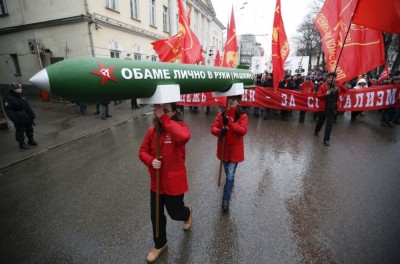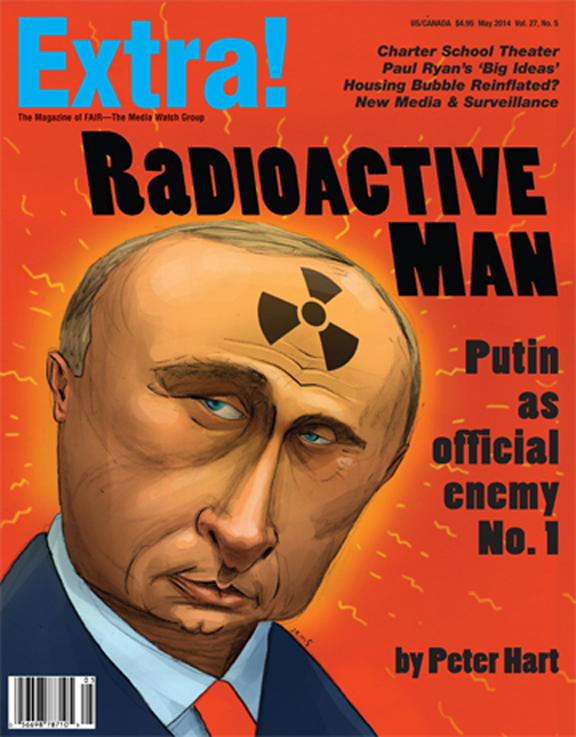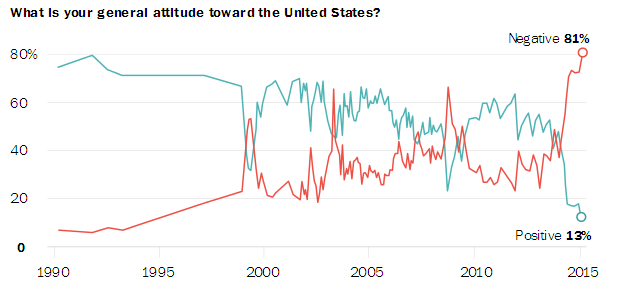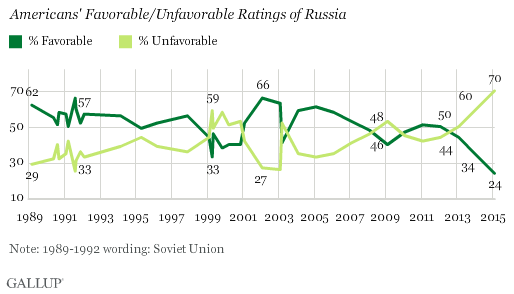Russia’s “Anti-Western Anger”: Funny How Russian Propaganda, US Free Press Produce Exact Same Mood Swings

The Washington Post illustrates a story about anti-Americanism in Russia with a photo of Communist demonstrators carrying a prop missile with an anti-Obama slogan; the Communist were supported by 17 percent of the Russian public in recent polling. (photo: Maxim Zmeyev/Reuters)
“Thought the Soviet Union was anti-American?” asks the Washington Post‘sMichael Birnbaum (3/8/15). “Try today’s Russia.”
Birnbaum, the Post‘s Moscow bureau chief, reports on a new “torrent of anti-Western fury” there:
After a year in which furious rhetoric has been pumped across Russian airwaves, anger toward the United States is at its worst since opinion polls began tracking it. From ordinary street vendors all the way up to the Kremlin, a wave of anti-US bile has swept the country, surpassing any time since the Stalin era, observers say….
More than 80 percent of Russians now hold negative views of the United States,according to the independent Levada Center, a number that has more than doubled over the past year and that is by far the highest negative rating since the center started tracking those views in 1988.
The “anti-Western anger” has been “fed by the powerful antagonism on Russian federal television channels” since “Putin cranked up the volume after protest movements in late 2011 and 2012, which he blamed on the State Department.” A political analyst is quoted:
What the government knew was that it was very easy to cultivate anti-Western sentiments, and it was easy to consolidate Russian society around this propaganda.
Wow, must be tough living in a totalitarian society like that, where people respond like puppets to government manipulation of the media, huh?
Funny thing, though–the anti-American sentiment in Russia is pretty much a mirror image of anti-Russian sentiment in the United States, which has likewise risen to record heights since polling began roughly 25 years ago. Here’s the polling of Russians about the US:
And here’s the polling of Americans about Russia, from Gallup (2/16/15):
Note that the spikes in hostility occur precisely together. The Post describes these as a “list of perceived slights from the United States”:
The United States and NATO bombed Serbia, a Russian ally, in 1999. Then came the war in Iraq, NATO expansion and the Russia-Georgia conflict. Each time, there were smaller spikes of anti-American sentiment that receded as quickly as they emerged.
 But they could just as easily be described as a list of perceived slights by Russia toward the United States. On both sides, the population seems to object about equally to the rival nation using violence against a smaller country and the rival nation failing to endorse one’s own nation’s use of violence.
But they could just as easily be described as a list of perceived slights by Russia toward the United States. On both sides, the population seems to object about equally to the rival nation using violence against a smaller country and the rival nation failing to endorse one’s own nation’s use of violence.
Despite the obvious symmetry in US/Russian public opinion, don’t expect the Washington Post to run any articles about how a wave of anti-Russian bile following a wave of furious rhetoric being pumped across US airwaves. That would raise an uncomfortable questions about how easy it for a US president to crank up the volume of anti-whomever sentiment–and the role of media outlets like the Post in facilitating such cranking up.



